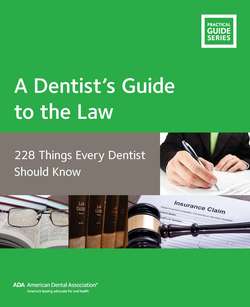Читать книгу A Dentist’s Guide to the Law - American Dental Association - Страница 86
На сайте Литреса книга снята с продажи.
43. What Are Some of the Liability Issues With Practice Websites?
ОглавлениеDental practice websites can enhance the doctor-patient relationship, promote patient care and health, and be a useful marketing tool.
However, it’s very easy for a dentist with a practice website to unwittingly take on legal exposure. Among the liability issues are: malpractice (for example, if you are viewed as giving professional advice online); false or misleading advertising; trademark and copyright violations; and breaching patient privacy. This risk will vary depending on the nature of your site, the extent of interactivity, etc.
These issues often come into play when you use electronic media other than your website. For example, when you send emails or participate in Internet chat rooms, you can create legal exposure. That is not to discourage you from taking advantage of technology. Just be aware of the legal concerns, and take simple protective measures such as clarifying in a signature line on your email that you are not giving professional advice.
If you decide to sponsor an interactive area on your website such as a chat room or blog, some legal exposure can come from third party comments (for example, defamation) so you may want to check with an attorney experienced in this area before setting up an interactive site. Website operators have been sued on a wide range of legal claims, including defamation and copyright infringement, based upon the remarks of third parties. Certain federal statutes offer website operators some legal protection for from the illegal postings of third parties. A federal law called the “Digital Millennium Copyright Act” offers a website operator some immunity from the copyright violations of third party posters. In order to be immune, the website operator must comply with various statutory requirements, including a procedure for promptly removing infringing material when it receives notice of a copyright violation.
Another statute, the “Communications Decency Act,” offers interactive service providers some immunity for third party content. The immunity does not extend to claims based on copyright laws and there are certain other exceptions. An interactive service provider can itself be seen as an information content provider. As one judge stated, “Websites are complicated enterprises, and there will always be close cases where a clever lawyer could argue that something the website operator did encouraged the illegality.”9 For this reason, it helps to check with a lawyer experienced in Internet law, particularly prior to starting up a chat room or blog.
